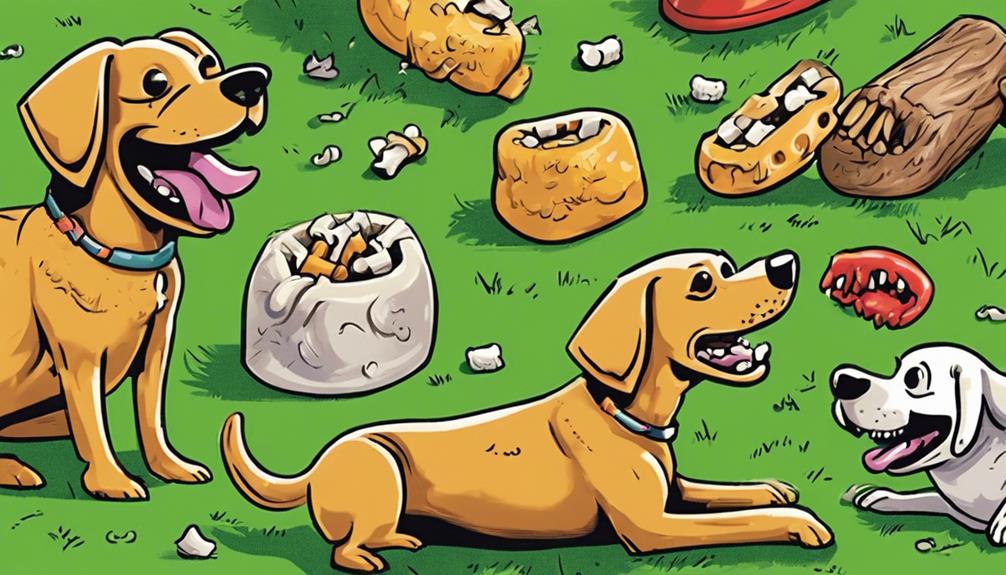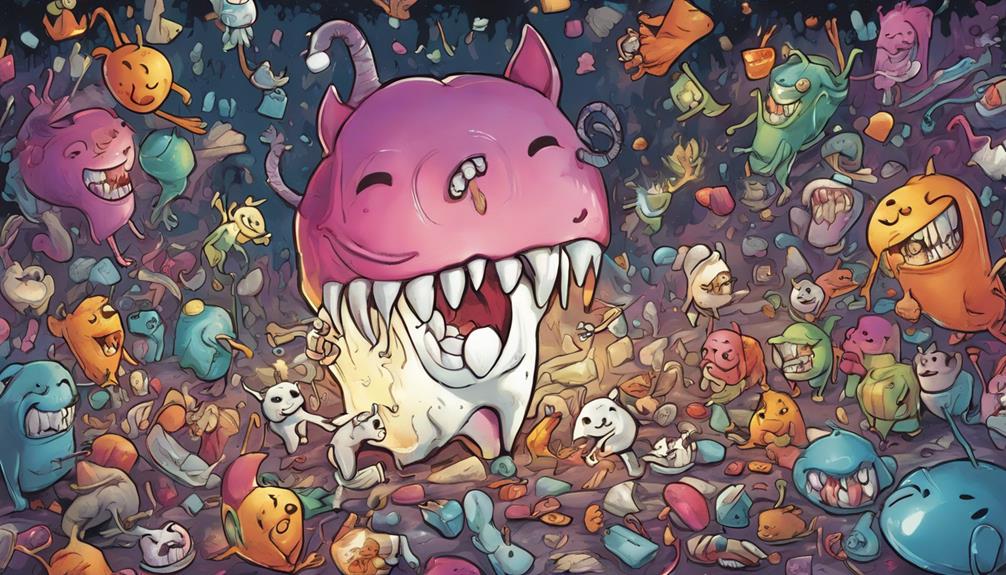Kittens usually start losing their baby teeth around 12 weeks old, with teething lasting until they're about six months. During this period, you'll notice their incisors dropping between 11 and 16 weeks, while canine teeth shed between 12 and 20 weeks. As they teethe, your kitten might show signs of discomfort like increased vocalization, excessive chewing, or decreased appetite. It's essential to provide soft food and engaging toys to help ease their pain. Understanding this process can help support your kitten's dental health. Stick around to explore more tips on caring for their teething needs.
Key Takeaways
- Kittens typically begin losing their baby teeth around 12 weeks of age.
- Incisor teeth drop out between 11 to 16 weeks.
- Canine teeth are shed between 12 to 20 weeks.
- Premolars start to emerge from 16 to 20 weeks.
Kitten Teething Timeline

Kittens start losing their baby teeth around 12 weeks, beginning a natural teething journey that lasts until they're about 6 months old. During this time, kittens may experience discomfort and may need to chew or suck on things to alleviate the pain. It’s important to provide them with appropriate chew toys to help with the teething process. Unlike puppies, kittens are not born with teeth. However, there are rare cases of babies born with teeth, which is known as natal teeth. It’s important to monitor a kitten’s teething progression and provide the necessary support to ensure a healthy transition to their adult teeth.
The timeline for kittens' teething is quite structured. Initially, the incisors, which are the first baby teeth, start to drop out between 11 to 16 weeks. You'll notice your kitten's little mouth changing as those tiny teeth make way for the adult ones.
Next come the canine teeth, shedding between 12 to 20 weeks. These are the sharp, pointy teeth that help your kitten grip and tear food.
After that, the premolars begin to emerge, with loss occurring from 16 to 20 weeks.
Symptoms of Teething

During the teething phase, you might notice your kitten exhibiting signs of discomfort, such as increased vocalization and excessive chewing on toys. This behavior is their way of coping with the irritation caused by emerging adult teeth. You may find them chewing on soft toys or other items, seeking relief for their sore gums.
Watch for additional signs like drooling and, in some cases, bleeding from the gums, which can indicate significant irritation. As your kitten goes through this process, you might also observe a decrease in their appetite. They could become cranky and reluctant to chew or bite down on toys due to the discomfort.
Pawing at their mouth can be another indicator that teething is taking place. Bad breath may also accompany this phase, adding to the overall signs of teething.
It's crucial to keep an eye on your kitten during this period, as these symptoms can help you monitor their comfort level and overall health. Understanding these signs can make it easier for you to support your kitten through their teething journey.
Easing Discomfort for Kittens

Providing comfort during teething can make a significant difference in your kitten's well-being and help ease their discomfort.
Start by offering soft food options like canned diet or soaked kibble, which can soothe sore gums and make mealtime more enjoyable for teething kittens.
Engaging in interactive playtime is another effective way to distract your kitten from their discomfort. It not only diverts their attention but also tires them out, keeping their spirits high.
You can also try giving them ice cubes made from low-sodium broth or diluted tuna juice. These not only feel revitalizing but also help soothe irritated gums.
Soft chew toys are essential, too; they provide a safe outlet for your kitten's chewing instincts while preventing them from gnawing on inappropriate items around your home.
Additionally, consider offering pet-safe cat grass. It serves as a gentle snack and gives your kitten something safe to chew on during this teething phase.
Importance of Dental Care

Establishing a solid dental care routine early on is essential for ensuring your kitten's long-term oral health and preventing common dental diseases. By starting dental care as soon as possible, you promote good oral hygiene and help your kitten become accustomed to regular brushing. This routine helps reduce plaque and tartar buildup, both of which can lead to serious issues like gingivitis and periodontal disease.
Incorporating dental diets and treats into your kitten's meals can further support their oral health. These specially formulated foods are designed to help manage plaque and tartar while providing essential nutrients.
Regular veterinary check-ups are vital for monitoring your kitten's teeth and gums. During these visits, your vet can identify any signs of dental diseases, including persistent baby teeth that fail to shed naturally.
Addressing these issues early through preventive care not only protects your kitten's teeth but also contributes to their overall health and well-being. By prioritizing dental care now, you're setting the stage for a lifetime of healthy teeth and gums for your furry friend.
Don't wait—start today!
Veterinary Guidance and Support

Regular veterinary check-ups help you monitor your kitten's dental health and catch any issues with their baby teeth early on.
During the teething process, it's crucial to look for signs of persistent teeth that don't fall out naturally. These may require veterinary intervention to prevent complications. Your vet will examine your kitten's mouth for signs of gingivitis or periodontal disease, which can be aggravated by retained baby teeth.
Documentation of any concerning symptoms—like excessive bleeding or pain—can provide valuable information to your veterinarian. Early dental care, including regular check-ups, is essential for making sure your kitten shifts smoothly into adulthood without long-term dental issues.
Veterinary guidance is key in establishing a proactive dental care routine. Your vet can recommend appropriate dental care practices, such as proper brushing techniques or safe chew toys that help manage the teething process.
Staying vigilant and seeking veterinary support guarantees your kitten maintains ideal dental health. By addressing any problems early, you can greatly reduce the risk of complications down the line, keeping your furry friend healthy and happy.
Frequently Asked Questions
Is It Normal for a 5 Month Old Kitten to Lose Teeth?
Yes, it's normal for a 5-month-old kitten to lose teeth. At this age, they typically start shedding baby teeth, making way for adult ones. You might even find them around your home!
Do Kittens Bite a Lot When Teething?
You'll notice your kitten gnawing on everything, from plush toys to your fingers. Yes, they bite a lot when teething, instinctively seeking relief for their sore gums, so provide them with safe chew toys to redirect that energy.
Will I See My Kittens Teeth Fall Out?
You might see your kitten's baby teeth fall out while they're playing or chewing on toys. It's common for them to spit out or accidentally swallow these teeth during their teething phase. Don't worry!
Does It Hurt Kittens When They Lose Their Teeth?
Yes, it can hurt kittens when they lose their teeth. You might notice them chewing more and pawing at their mouths. This discomfort usually passes quickly, but watch for any signs of persistent pain.
Is the Timeline for Losing Baby Teeth Similar for Kittens and Puppies?
Yes, the timeline for losing baby teeth is similar for kittens and puppies. This process, known as “when puppies lose teeth,” typically starts at around 3-4 months of age and continues until they are about 6-8 months old. Similarly, kittens also begin losing their baby teeth around 3-4 months of age.
Conclusion
In the journey of your kitten growing up, remember that 'patience is a virtue.'
As your furry friend navigates the teething process, you can ease their discomfort with toys and gentle care.
Don't forget to prioritize dental hygiene, setting the stage for a lifetime of healthy teeth.
By staying informed and seeking veterinary advice when needed, you're ensuring your kitten not only loses their baby teeth but grows into a healthy adult cat.









